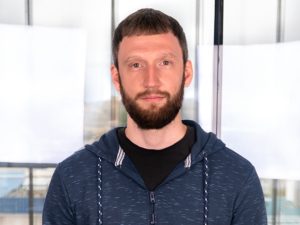Andrey Golov

What do you like about science?
What I appreciate about science is its ability to solve complex problems, inspire curiosity and innovation, and bring people together in pursuit of a common goal. Additionally, science can be a way of self-expression and creativity.
If you have not become a scientist, what would you be today?
Perhaps, I would be a programmer.
What is your favorite place at work? Outside work?
As I spend most of my time working at my desk in front of a laptop, I find the canteen to be one of my favorite places at work. During lunch or coffee breaks, I like to communicate with my colleagues, share scientific problems, and exchange thoughts. These discussions often provide a different perspective on the problem and help to find a solution. Outside of work, I enjoy spending time in nature, whether it’s taking a leisurely walk in a forest or embarking on a challenging mountain bike ride.
What is your role in the SUBLIME project?
As part of the SUBLIME project, I am responsible for the atomistic modeling of chemical processes at the interface between argyrodite Li6PS5Cl solid electrolyte and a metallic lithium anode. This compound is a promising candidate for use as an electrolyte in all-solid-state batteries due to its high ionic conductivity, which is comparable to liquid electrolytes. However, the Li6PS5Cl is unstable in contact with metallic lithium. The degradation process leads to an increase in impedance and ultimately battery failure. Through the use of density functional-based molecular dynamics simulations, we aim to gain a deeper understanding of this process. This could help to develop strategies to tune the solid electrolyte interface for designing more sustainable batteries.
How do you think will the results of SUBLIME contribute to a more sustainable world? How will the world be different after SUBLIME?
I believe that the results of the SUBLIME project will contribute to the development of sustainable and high-energy-dense all-solid-state batteries (ASSBs). These batteries could make renewable energy sources such as wind and solar power more viable, leading to a sustainable energy future and a reduction in greenhouse gas emissions. ASSBs can also power electric vehicles, store renewable energy, and power portable devices more efficiently than traditional Li-ion batteries with a liquid electrolyte.
What research are you conducting at your institution and how is it applied in the SUBLIME project?
CIC Energigune leads research in materials and systems for thermal and electrochemical energy storage. Our team is dedicated to developing innovative materials and technologies that facilitate more efficient and sustainable energy storage solutions. As a member of the “MODELLING AND COMPUTATIONAL SIMULATION” group, my research focuses on studying fundamental aspects of electrochemical processes that occur in batteries. Specifically, within the SUBLIME project, our group applies theoretical approaches to investigate the degradation process at the interface between the sulfide solid electrolyte and the lithium anode.